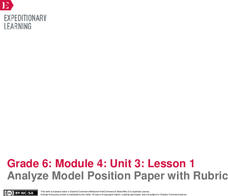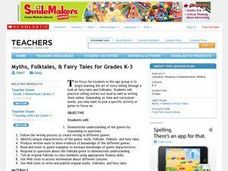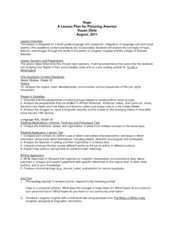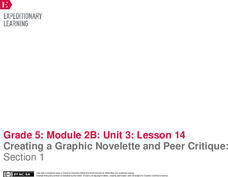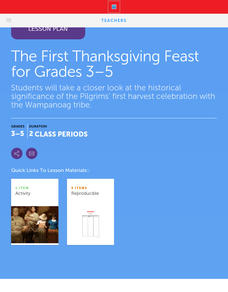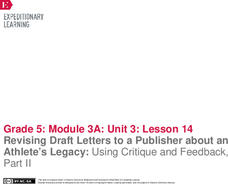EngageNY
Connecting the Theme of the Expert Group Myth to a Theme in The Lightning Thief and to Life Lessons
Expert groups discuss the theme of their myths and the life lessons people learn from it. They then regroup their triads so that there is a pupil from each expert myth group and share details about their myths. The class also talks about...
HISTORY Channel
The American Presidency Grades 7-9
As part of a study of the American Presidency, groups investigate five topics: Campaigns and Elections, Role and Responsibilities, Life in the White House, Assassination and Mourning, and Communicating the Presidency.
EngageNY
Performance Task Preparation: Peer Critique and Mini-Lesson Addressing Common Errors: Revising Draft Essay to Inform
Time to revise! Using a writing evaluation rubric, scholars participate in a peer editing process to provide feedback on each others' informative essays. Next, pupils begin revising their drafts based on the feedback they receive.
EngageNY
Grade 11 ELA Module 4 Overview
The intricate craft of narrative writing can make a happy story feel exuberant or a sad story feel devastating. With 42 extensive lessons that include poignant discussion questions, standards-aligned self-reflections, engaging writing...
Nemours KidsHealth
Asthma: Grades 9-12
Two activities encourage high schoolers to learn about asthma. In the first lesson, learners watch two videos that feature individuals talking about how they manage their condition. Groups then craft videos about how pupils can support...
Michigan Association of Intermediate School Administrators
Persuasive Essay: Grade 5
Improve your fifth graders' persuasive writing skills in four weeks. Working independently, in peer editing groups, and with instruction, writers work over the 17 sessions to craft an argumentative essay. They craft a...
Bermingham City Schools
Opinion Writing
It's no secret that children can be very opinionated, but rather than fight against this natural tendency, embrace it with this primary grade writing project. After a shared reading of a children's book about...
EngageNY
Analyze Model Position Paper with Rubric
It's time to choose a position! Scholars read a model position paper about fracking to practice identifying the topic and argument. Then, working with a partner, they use a rubric to assess the essay.
Polar Trec
Science in Antarctica
PolarTREC brings polar researchers and educators together to benefit both science and education. Pupils select one research project in Antarctica to explore and present to their peers. Scholars polish research and presentation skills as...
Curated OER
Myths, Folktales, & Fairy Tales for Grades K-3
Have your class explore the art of storytelling through this activity on fairy tales and folktales. Learners interact with a variety of fairy tales and folktales. They practice telling stories out loud as well as writing their own. This...
EngageNY
Grade 10 ELA Module 1: Unit 3, Lesson 9
Having prepared for an analysis essay about one of the characters from The Joy Luck Club by Amy Tan, tenth graders demonstrate their understanding in a mid-unit assessment. They focus on either Jing-Mei or Waverly in an informative...
Curated OER
Answering and Scoring Open-Ended Questions
Help learners respond in the best way possible to open-ended questions. Go through the ACE method with a text and question of your choice. Scholars work in groups to post their responses on the board. An attached rubric is used for...
EngageNY
End of Unit 2 Assessment: Final Literary Analysis
Get ready to review and revise! Scholars peer edit each other's literary analysis essay drafts. Next, using peer and teacher feedback, pupils compose their final drafts.
Curated OER
Picturing America: Images and Words of Hope from Romare Bearden and Langston Hughes
A carefully crafted three-day lesson integrates poetry and visual art. By analyzing and comparing Langston Hughes' poem "Mother and Son" and Romare Bearden's collage "The Dove," readers explore the theme of hope. The lesson activates...
American Physiological Society
What Environmental Conditions Lead to the Hatching of Brine Shrimp?
Will changing the environment in which brine shrimp live impact their reproductive success? Young scientists get hands-on experience studying the habitat of brine shrimp in a two-week immersion lesson. The teacher's guide provides all of...
UNICEF
Get Real on Climate
Climate change isn't just about a warming planet; it will affect humans' health, spread of disease, changes in heat waves and droughts, and changes in storms and wildfires. Participants explore global climate change through discussions...
EngageNY
Creating a Graphic Novelette and Peer Critique: Section 1
Help the class put a plan in place. With the detailed resource, pupils plan the first section of their graphic novelettes about an invention, creating and labeling their pages. Next, they work with partners to give and receive feedback...
Scholastic
The First Thanksgiving Feast for Grades 3-5
Scholars examine the first Thanksgiving through books and interviews while they complete a KWL chart. Pretending they are part of the feast, learners craft a scrapbook page that features images related to their experience. Pupils reflect...
EngageNY
End of Unit Assessment: On-Demand Informational Paragraph About How the Poison Dart Frog Survives
A final assessment marks the end of a unit that takes a close look at a variety of informational texts all about frogs. A graphic organizer aides scholars in planning an accordion paragraph using their recorder forms from previous...
Maryland Department of Education
The Concept of Diversity in World Literature Lesson 7: Cultural Commentary
As part of their study of Things Fall Apart, class groups develop a multimedia presentation in response to the question, "In what ways does Achebe use literature as a means to express and comment on culture and history?"
ReadWriteThink
Promoting Student Self-Assessment
Keep class members accountable for their own learning with a series of differentiated instruction strategies. From rubrics created by pupils to learning contracts written at the beginning of the year, the resource offers multiple ways...
Weebly
Nationalism Project
Don't just ask your class to define nationalism, but invite them to experience it with an engaging project. Learners are divided into groups to design four items—a flag, slogan, national anthem, and historical tale—for a fictional...
Messenger Education
Exploring Exploring
The reason people first began trading was because of their desires for objects other societies possessed. In the activity, classes discuss why exploration has been a common thread in all societies and where these desires have taken...
EngageNY
Revising Draft Letters to a Publisher about an Athlete’s Legacy: Using Critique and Feedback, Part II
Let's get opinionated. Scholars participate in a peer critique and revision process using a fun activity called a Four Corners strategy. After incorporating classmates' feedback, individuals share their final drafts of their opinion...









